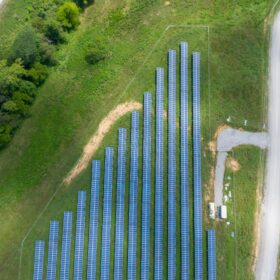The New Jersey Assembly unanimously passed a bill to require automated solar permitting. The Senate Environment and Energy Committee advanced the Senate version the same day.
The legislation A5265 would require the commissioner to provide departments, enforcing agencies and contractors with the “State Smart Solar Permitting Platform.” Local enforcing agency would then be required to allow applicants to submit permits for residential solar energy systems through either the State Smart Solar Permitting Platform or an alternative automated solar permitting platform that satisfies requirements.
According to the legislation, New Jersey has the fifth slowest known solar permitting timelines of any state in the country.
Increasing solar installations will save New Jersey ratepayers more than $87 million by 2030 and add more than 560 clean energy jobs, according to a letter signed by 33 organizations in support of the bill.
Estimates vary for how much New Jersey’s permit approvals and related barriers increase average project costs, but according to the coalition’s letter, which cites an upcoming Greenhouse Institute analysis, permit approvals and related barriers add an estimated $3,800 to $4,500 to average project costs. The legislation cites estimates from the Solar Energy Industries Association (SEIA), which found New Jersey typically increase the cost of installing a residential solar energy system by $6,000 to $7,000.
The bill would enable the platform to:
- perform robust code compliance checks to evaluate proposed residential solar energy systems to determine whether they comply with the requirements of the State Uniform Construction Code;
- produce construction documents to be used for inspection and recordkeeping purposes under the code;
- instantly release a permit or permit revision to construct a residential solar energy system that is in compliance with code;
- be designed to process 75% of submitted residential solar energy system permit applications;
- be available for use 24 hours a day;
- be provided to the department at no cost or low cost if provided by a third party;
- allow electronic signatures for the applications and submitted materials;
- provide customer service for navigating the state platform; and
- be able to process permit applications for residential solar energy systems and associated equipment.
Across the United States, 22% of projects that apply for permits are cancelled, most commonly due to permitting delays, according to the Environment Illinois Research & Education Center and the Illinois PIRG Education Fund.
Bills to remove permitting bottlenecks began popping up across the country this year, but most fell flat. Solar permitting bills died off or in Minnesota, Massachusetts, Hawaii, New York and Illinois. Florida’s bill was withdrawn from consideration. Colorado introduced a bill to require automated permitting, but the state’s House of Representatives gutted the bulk of the bill.
However, Texas passed a bill that aims to fast-track residential solar and storage installations. A bill is underway in Arizona, which has about a month left to its session. California adopted SolarAPP+ last year, with Maryland following suit later that year (while Maryland’s mandate for automated solar permitting does not specifically require SolarAPP+, the state incentivizes its adoption through grants).
Read about other solar-related bills state lawmakers are debating this legislative session here.
This content is protected by copyright and may not be reused. If you want to cooperate with us and would like to reuse some of our content, please contact: editors@pv-magazine.com.









By submitting this form you agree to pv magazine using your data for the purposes of publishing your comment.
Your personal data will only be disclosed or otherwise transmitted to third parties for the purposes of spam filtering or if this is necessary for technical maintenance of the website. Any other transfer to third parties will not take place unless this is justified on the basis of applicable data protection regulations or if pv magazine is legally obliged to do so.
You may revoke this consent at any time with effect for the future, in which case your personal data will be deleted immediately. Otherwise, your data will be deleted if pv magazine has processed your request or the purpose of data storage is fulfilled.
Further information on data privacy can be found in our Data Protection Policy.